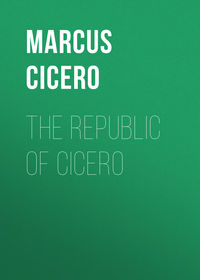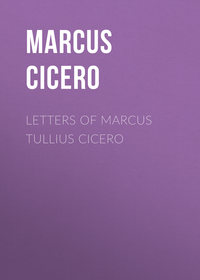 полная версия
полная версияCicero's Tusculan Disputations
XXI. I cannot, therefore, conceive that this constant course of the planets, this just agreement in such various motions through all eternity, can be preserved without a mind, reason, and consideration; and since we may perceive these qualities in the stars, we cannot but place them in the rank of Gods. Those which are called the fixed stars have the same indications of reason and prudence. Their motion is daily, regular, and constant. They do not move with the sky, nor have they an adhesion to the firmament, as they who are ignorant of natural philosophy affirm. For the sky, which is thin, transparent, and suffused with an equal heat, does not seem by its nature to have power to whirl about the stars, or to be proper to contain them. The fixed stars, therefore, have their own sphere, separate and free from any conjunction with the sky. Their perpetual courses, with that admirable and incredible regularity of theirs, so plainly declare a divine power and mind to be in them, that he who cannot perceive that they are also endowed with divine power must be incapable of all perception whatever.
In the heavens, therefore, there is nothing fortuitous, unadvised, inconstant, or variable: all there is order, truth, reason, and constancy; and all the things which are destitute of these qualities are counterfeit, deceitful, and erroneous, and have their residence about the earth135 beneath the moon, the lowest of all the planets. He, therefore, 276who believes that this admirable order and almost incredible regularity of the heavenly bodies, by which the preservation and entire safety of all things is secured, is destitute of intelligence, must be considered to be himself wholly destitute of all intellect whatever.
I think, then, I shall not deceive myself in maintaining this dispute upon the principle of Zeno, who went the farthest in his search after truth.
XXII. Zeno, then, defines nature to be “an artificial fire, proceeding in a regular way to generation;” for he thinks that to create and beget are especial properties of art, and that whatever may be wrought by the hands of our artificers is much more skilfully performed by nature, that is, by this artificial fire, which is the master of all other arts.
According to this manner of reasoning, every particular nature is artificial, as it operates agreeably to a certain method peculiar to itself; but that universal nature which embraces all things is said by Zeno to be not only artificial, but absolutely the artificer, ever thinking and providing all things useful and proper; and as every particular nature owes its rise and increase to its own proper seed, so universal nature has all her motions voluntary, has affections and desires (by the Greeks called ὁρμὰς) productive of actions agreeable to them, like us, who have sense and understanding to direct us. Such, then, is the intelligence of the universe; for which reason it may be properly termed prudence or providence (in Greek, πρόνοια), since her chiefest care and employment is to provide all things fit for its duration, that it may want nothing, and, above all, that it may be adorned with all perfection of beauty and ornament.
XXIII. Thus far have I spoken concerning the universe, and also of the stars; from whence it is apparent that there is almost an infinite number of Gods, always in action, but without labor or fatigue; for they are not composed of veins, nerves, and bones; their food and drink are not such as cause humors too gross or too subtle; nor are their bodies such as to be subject to the fear of falls or blows, or in danger of diseases from a weariness of limbs. Epicurus, to secure his Gods from such accidents, 277has made them only outlines of Deities, void of action; but our Gods being of the most beautiful form, and situated in the purest region of the heavens, dispose and rule their course in such a manner that they seem to contribute to the support and preservation of all things.
Besides these, there are many other natures which have with reason been deified by the wisest Grecians, and by our ancestors, in consideration of the benefits derived from them; for they were persuaded that whatever was of great utility to human kind must proceed from divine goodness, and the name of the Deity was applied to that which the Deity produced, as when we call corn Ceres, and wine Bacchus; whence that saying of Terence,136
Without Ceres and Bacchus, Venus starves.And any quality, also, in which there was any singular virtue was nominated a Deity, such as Faith and Wisdom, which are placed among the divinities in the Capitol; the last by Æmilius Scaurus, but Faith was consecrated before by Atilius Calatinus. You see the temple of Virtue and that of Honor repaired by M. Marcellus, erected formerly, in the Ligurian war, by Q. Maximus. Need I mention those dedicated to Help, Safety, Concord, Liberty, and Victory, which have been called Deities, because their efficacy has been so great that it could not have proceeded from any but from some divine power? In like manner are the names of Cupid, Voluptas, and of Lubentine Venus consecrated, though they were things vicious and not natural, whatever Velleius may think to the contrary, for they frequently stimulate nature in too violent a manner. Everything, then, from which any great utility proceeded was deified; and, indeed, the names I have just now mentioned are declaratory of the particular virtue of each Deity.
XXIV. It has been a general custom likewise, that men who have done important service to the public should be exalted to heaven by fame and universal consent. Thus Hercules, Castor and Pollux, Æsculapius, and Liber became Gods (I mean Liber137 the son of Semele, and not him138 whom our ancestors consecrated in such state and 278solemnity with Ceres and Libera; the difference in which may be seen in our Mysteries.139 But because the offsprings of our bodies are called “Liberi” (children), therefore the offsprings of Ceres are called Liber and Libera (Libera140 is the feminine, and Liber the masculine); thus likewise Romulus, or Quirinus—for they are thought to be the same—became a God.
They are justly esteemed as Deities, since their souls subsist and enjoy eternity, from whence they are perfect and immortal beings.
There is another reason, too, and that founded on natural philosophy, which has greatly contributed to the number of Deities; namely, the custom of representing in human form a crowd of Gods who have supplied the poets with fables, and filled mankind with all sorts of superstition. Zeno has treated of this subject, but it has been discussed more at length by Cleanthes and Chrysippus. All Greece was of opinion that Cœlum was castrated by his son Saturn,141 and that Saturn was chained by his son Jupiter. In these impious fables, a physical and not inelegant meaning is contained; for they would denote that the celestial, most exalted, and ethereal nature—that is, the fiery nature, which produces all things by itself—is destitute of that part of the body which is necessary for the act of generation by conjunction with another.
XXV. By Saturn they mean that which comprehends the course and revolution of times and seasons; the Greek name for which Deity implies as much, for he is called 279Κρόνος, which is the same with Χρόνος, that is, a “space of time.” But he is called Saturn, because he is filled (saturatur) with years; and he is usually feigned to have devoured his children, because time, ever insatiable, consumes the rolling years; but to restrain him from immoderate haste, Jupiter has confined him to the course of the stars, which are as chains to him. Jupiter (that is, juvans pater) signifies a “helping father,” whom, by changing the cases, we call Jove,142 a juvando. The poets call him “father of Gods and men;”143 and our ancestors “the most good, the most great;” and as there is something more glorious in itself, and more agreeable to others, to be good (that is, beneficent) than to be great, the title of “most good” precedes that of “most great.” This, then, is he whom Ennius means in the following passage, before quoted—
Look up to the refulgent heaven above,Which all men call, unanimously, Jove:which is more plainly expressed than in this other passage144 of the same poet—
On whose account I’ll curse that flood of light,Whate’er it is above that shines so bright.Our augurs also mean the same, when, for the “thundering and lightning heaven,” they say the “thundering and lightning Jove.” Euripides, among many excellent things, has this:
The vast, expanded, boundless sky behold,See it with soft embrace the earth enfold;This own the chief of Deities above,And this acknowledge by the name of Jove.XXVI. The air, according to the Stoics, which is between the sea and the heaven, is consecrated by the name of Juno, and is called the sister and wife of Jove, because 280it resembles the sky, and is in close conjunction with it. They have made it feminine, because there is nothing softer. But I believe it is called Juno, a juvando (from helping).
To make three separate kingdoms, by fable, there remained yet the water and the earth. The dominion of the sea is given, therefore, to Neptune, a brother, as he is called, of Jove; whose name, Neptunus—as Portunus, a portu, from a port—is derived a nando (from swimming), the first letters being a little changed. The sovereignty and power over the earth is the portion of a God, to whom we, as well as the Greeks, have given a name that denotes riches (in Latin, Dis; in Greek, Πλούτων), because all things arise from the earth and return to it. He forced away Proserpine (in Greek called Περσεφόνη), by which the poets mean the “seed of corn,” from whence comes their fiction of Ceres, the mother of Proserpine, seeking for her daughter, who was hidden from her. She is called Ceres, which is the same as Geres—a gerendis frugibus145—“from bearing fruit,” the first letter of the word being altered after the manner of the Greeks, for by them she is called Δημήτηρ, the same as Γημήτηρ.146 Again, he (qui magna vorteret) “who brings about mighty changes” is called Mavors; and Minerva is so called because (minueret, or minaretur) she diminishes or menaces.
XXVII. And as the beginnings and endings of all things are of the greatest importance, therefore they would have their sacrifices to begin with Janus.147 His name is derived ab eundo, from passing; from whence thorough passages are called jani, and the outward doors of common houses are called januæ. The name of Vesta is, from the Greeks, the same with their Ἑστία. Her province is over altars and hearths; and in the name of this Goddess, who is the keeper of all things within, prayers and sacrifices are concluded. The Dii Penates, “household Gods,” have some affinity with this power, and are so called either from penus, 281“all kind of human provisions,” or because penitus insident (they reside within), from which, by the poets, they are called penetrales also. Apollo, a Greek name, is called Sol, the sun; and Diana, Luna, the moon. The sun (sol) is so named either because he is solus (alone), so eminent above all the stars; or because he obscures all the stars, and appears alone as soon as he rises. Luna, the moon, is so called a lucendo (from shining); she bears the name also of Lucina: and as in Greece the women in labor invoke Diana Lucifera, so here they invoke Juno Lucina. She is likewise called Diana omnivaga, not a venando (from hunting), but because she is reckoned one of the seven stars that seem to wander.148 She is called Diana because she makes a kind of day of the night;149 and presides over births, because the delivery is effected sometimes in seven, or at most in nine, courses of the moon; which, because they make mensa spatia (measured spaces), are called menses (months). This occasioned a pleasant observation of Timæus (as he has many). Having said in his history that “the same night in which Alexander was born, the temple of Diana at Ephesus was burned down,” he adds, “It is not in the least to be wondered at, because Diana, being willing to assist at the labor of Olympias,150 was absent from home.” But to this Goddess, because ad res omnes veniret—“she has an influence upon all things”—we have given the appellation of Venus,151 from whom the word venustas (beauty) is rather derived than Venus from venustas.
XXVIII. Do you not see, therefore, how, from the productions of nature and the useful inventions of men, have arisen fictitious and imaginary Deities, which have been the foundation of false opinions, pernicious errors, and wretched superstitions? For we know how the different forms of the Gods—their ages, apparel, ornaments; their 282pedigrees, marriages, relations, and everything belonging to them—are adapted to human weakness and represented with our passions; with lust, sorrow, and anger, according to fabulous history: they have had wars and combats, not only, as Homer relates, when they have interested themselves in two different armies, but when they have fought battles in their own defence against the Titans and giants. These stories, of the greatest weakness and levity, are related and believed with the most implicit folly.
But, rejecting these fables with contempt, a Deity is diffused in every part of nature; in earth under the name of Ceres, in the sea under the name of Neptune, in other parts under other names. Yet whatever they are, and whatever characters and dispositions they have, and whatever name custom has given them, we are bound to worship and adore them. The best, the chastest, the most sacred and pious worship of the Gods is to reverence them always with a pure, perfect, and unpolluted mind and voice; for our ancestors, as well as the philosophers, have separated superstition from religion. They who prayed whole days and sacrificed, that their children might survive them (ut superstites essent), were called superstitious, which word became afterward more general; but they who diligently perused, and, as we may say, read or practised over again, all the duties relating to the worship of the Gods, were called religiosi—religious, from relegendo—“reading over again, or practising;” as elegantes, elegant, ex eligendo, “from choosing, making a good choice;” diligentes, diligent, ex diligendo, “from attending on what we love;” intelligentes, intelligent, from understanding—for the signification is derived in the same manner. Thus are the words superstitious and religious understood; the one being a term of reproach, the other of commendation. I think I have now sufficiently demonstrated that there are Gods, and what they are.
XXIX. I am now to show that the world is governed by the providence of the Gods. This is an important point, which you Academics endeavor to confound; and, indeed, the whole contest is with you, Cotta; for your sect, Velleius, know very little of what is said on different subjects by other schools. You read and have a taste only for 283your own books, and condemn all others without examination. For instance, when you mentioned yesterday152 that prophetic old dame Πρόνοια, Providence, invented by the Stoics, you were led into that error by imagining that Providence was made by them to be a particular Deity that governs the whole universe, whereas it is only spoken in a short manner; as when it is said “The commonwealth of Athens is governed by the council,” it is meant “of the Areopagus;”153 so when we say “The world is governed by providence,” we mean “by the providence of the Gods.” To express ourselves, therefore, more fully and clearly, we say, “The world is governed by the providence of the Gods.” Be not, therefore, lavish of your railleries, of which your sect has little to spare: if I may advise you, do not attempt it. It does not become you, it is not your talent, nor is it in your power. This is not applied to you in particular who have the education and politeness of a Roman, but to all your sect in general, and especially to your leader154—a man unpolished, illiterate, insulting, without wit, without reputation, without elegance.
XXX. I assert, then, that the universe, with all its parts, was originally constituted, and has, without any cessation, been ever governed by the providence of the Gods. This argument we Stoics commonly divide into three parts; the first of which is, that the existence of the Gods being once known, it must follow that the world is governed by their wisdom; the second, that as everything is under the direction of an intelligent nature, which has produced that beautiful order in the world, it is evident that it is formed from animating principles; the third is deduced from those glorious works which we behold in the heavens and the earth.
First, then, we must either deny the existence of the Gods (as Democritus and Epicurus by their doctrine of images in some sort do), or, if we acknowledge that there 284are Gods, we must believe they are employed, and that, too, in something excellent. Now, nothing is so excellent as the administration of the universe. The universe, therefore, is governed by the wisdom of the Gods. Otherwise, we must imagine that there is some cause superior to the Deity, whether it be a nature inanimate, or a necessity agitated by a mighty force, that produces those beautiful works which we behold. The nature of the Gods would then be neither supreme nor excellent, if you subject it to that necessity or to that nature, by which you would make the heaven, the earth, and the seas to be governed. But there is nothing superior to the Deity; the world, therefore, must be governed by him: consequently, the Deity is under no obedience or subjection to nature, but does himself rule over all nature. In effect, if we allow the Gods have understanding, we allow also their providence, which regards the most important things; for, can they be ignorant of those important things, and how they are to be conducted and preserved, or do they want power to sustain and direct them? Ignorance is inconsistent with the nature of the Gods, and imbecility is repugnant to their majesty. From whence it follows, as we assert, that the world is governed by the providence of the Gods.
XXXI. But supposing, which is incontestable, that there are Gods, they must be animated, and not only animated, but endowed with reason—united, as we may say, in a civil agreement and society, and governing together one universe, as a republic or city. Thus the same reason, the same verity, the same law, which ordains good and prohibits evil, exists in the Gods as it does in men. From them, consequently, we have prudence and understanding, for which reason our ancestors erected temples to the Mind, Faith, Virtue, and Concord. Shall we not then allow the Gods to have these perfections, since we worship the sacred and august images of them? But if understanding, faith, virtue, and concord reside in human kind, how could they come on earth, unless from heaven? And if we are possessed of wisdom, reason, and prudence, the Gods must have the same qualities in a greater degree; and not only have them, but employ them in the best and greatest works. The universe is the best and greatest 285work; therefore it must be governed by the wisdom and providence of the Gods.
Lastly, as we have sufficiently shown that those glorious and luminous bodies which we behold are Deities—I mean the sun, the moon, the fixed and wandering stars, the firmament, and the world itself, and those other things also which have any singular virtue, and are of any great utility to human kind—it follows that all things are governed by providence and a divine mind. But enough has been said on the first part.
XXXII. It is now incumbent on me to prove that all things are subjected to nature, and most beautifully directed by her. But, first of all, it is proper to explain precisely what that nature is, in order to come to the more easy understanding of what I would demonstrate. Some think that nature is a certain irrational power exciting in bodies the necessary motions. Others, that it is an intelligent power, acting by order and method, designing some end in every cause, and always aiming at that end, whose works express such skill as no art, no hand, can imitate; for, they say, such is the virtue of its seed, that, however small it is, if it falls into a place proper for its reception, and meets with matter conducive to its nourishment and increase, it forms and produces everything in its respective kind; either vegetables, which receive their nourishment from their roots; or animals, endowed with motion, sense, appetite, and abilities to beget their likeness.
Some apply the word nature to everything; as Epicurus does, who acknowledges no cause, but atoms, a vacuum, and their accidents. But when we155 say that nature forms and governs the world, we do not apply it to a clod of earth, or piece of stone, or anything of that sort, whose parts have not the necessary cohesion,156 but to a tree, in 286which there is not the appearance of chance, but of order and a resemblance of art.
XXXIII. But if the art of nature gives life and increase to vegetables, without doubt it supports the earth itself; for, being impregnated with seeds, she produces every kind of vegetable, and embracing their roots, she nourishes and increases them; while, in her turn, she receives her nourishment from the other elements, and by her exhalations gives proper sustenance to the air, the sky, and all the superior bodies. If nature gives vigor and support to the earth, by the same reason she has an influence over the rest of the world; for as the earth gives nourishment to vegetables, so the air is the preservation of animals. The air sees with us, hears with us, and utters sounds with us; without it, there would be no seeing, hearing, or sounding. It even moves with us; for wherever we go, whatever motion we make, it seems to retire and give place to us.
That which inclines to the centre, that which rises from it to the surface, and that which rolls about the centre, constitute the universal world, and make one entire nature; and as there are four sorts of bodies, the continuance of nature is caused by their reciprocal changes; for the water arises from the earth, the air from the water, and the fire from the air; and, reversing this order, the air arises from fire, the water from the air, and from the water the earth, the lowest of the four elements, of which all beings are formed. Thus by their continual motions backward and forward, upward and downward, the conjunction of the several parts of the universe is preserved; a union which, in the beauty we now behold it, must be eternal, or at least of a very long duration, and almost for an infinite space of time; and, whichever it is, the universe must of consequence be governed by nature. For what art of navigating fleets, or of marshalling an army, and—to instance the produce of nature—what vine, what tree, what animated form and conformation of their members, give us so great an indication of skill as appears in the universe? Therefore we must either deny that there is the least trace of an intelligent nature, or acknowledge that the world is governed by it. But since the universe 287contains all particular beings, as well as their seeds, can we say that it is not itself governed by nature? That would be the same as saying that the teeth and the beard of man are the work of nature, but that the man himself is not. Thus the effect would be understood to be greater than the cause.
XXXIV. Now, the universe sows, as I may say, plants, produces, raises, nourishes, and preserves what nature administers, as members and parts of itself. If nature, therefore, governs them, she must also govern the universe. And, lastly, in nature’s administration there is nothing faulty. She produced the best possible effect out of those elements which existed. Let any one show how it could have been better. But that can never be; and whoever attempts to mend it will either make it worse, or aim at impossibilities.
But if all the parts of the universe are so constituted that nothing could be better for use or beauty, let us consider whether this is the effect of chance, or whether, in such a state they could possibly cohere, but by the direction of wisdom and divine providence. Nature, therefore, cannot be void of reason, if art can bring nothing to perfection without it, and if the works of nature exceed those of art. How is it consistent with common-sense that when you view an image or a picture, you imagine it is wrought by art; when you behold afar off a ship under sail, you judge it is steered by reason and art; when you see a dial or water-clock,157 you believe the hours are shown by art, and not by chance; and yet that you should imagine that the universe, which contains all arts and the artificers, can be void of reason and understanding?









